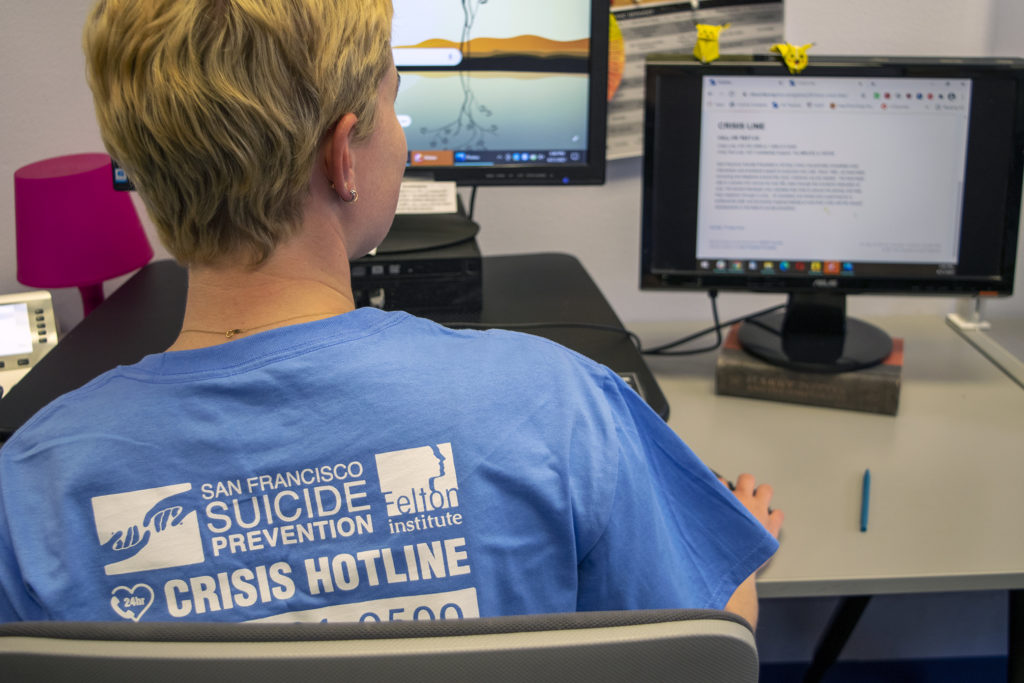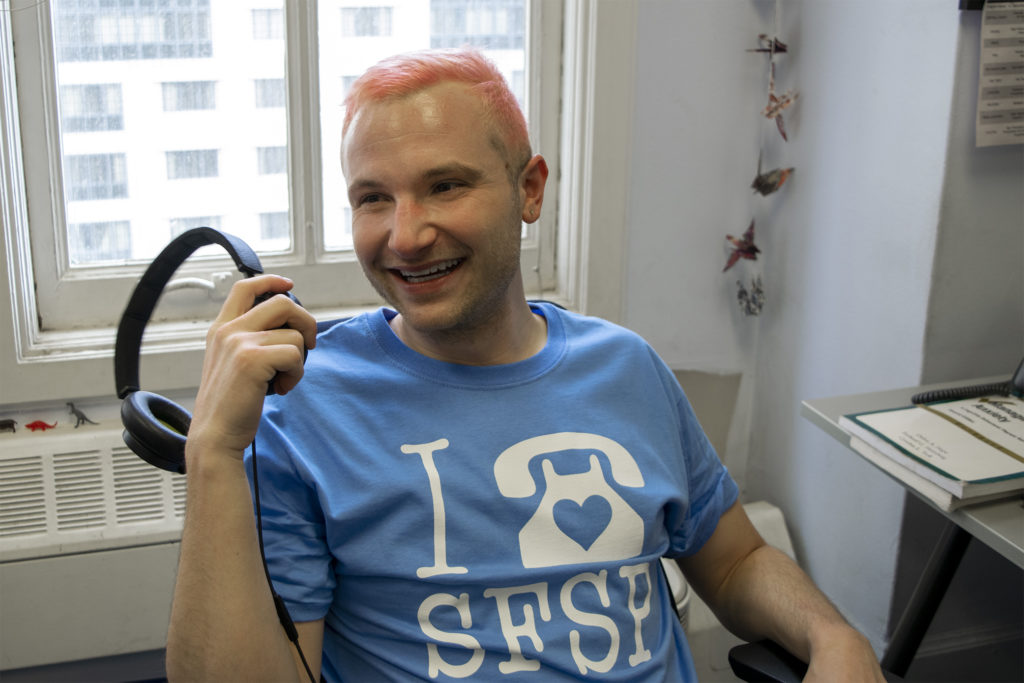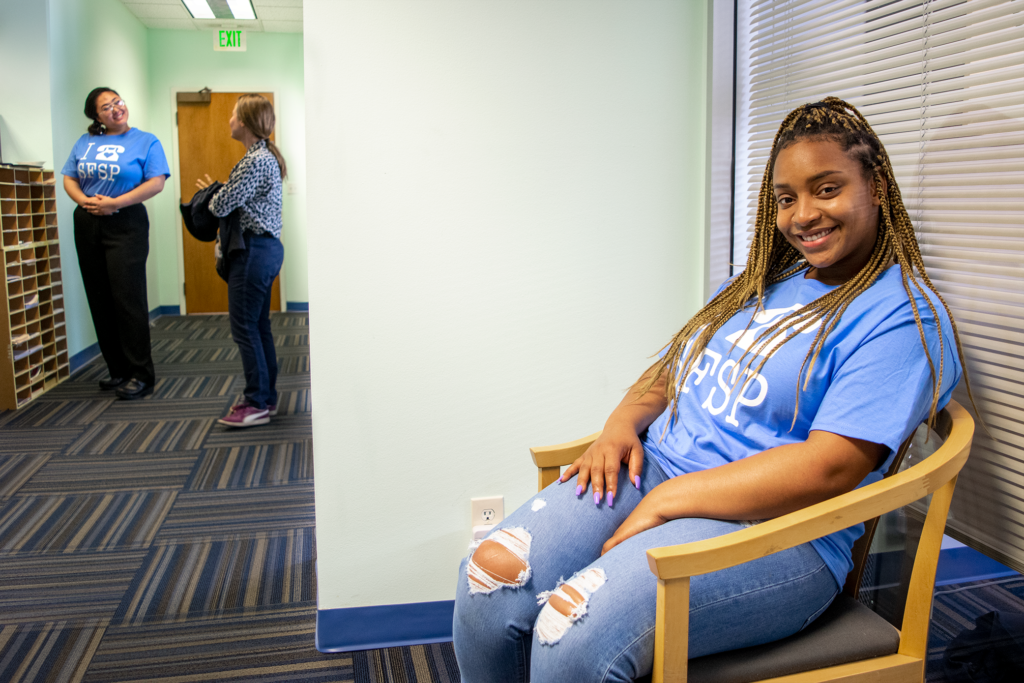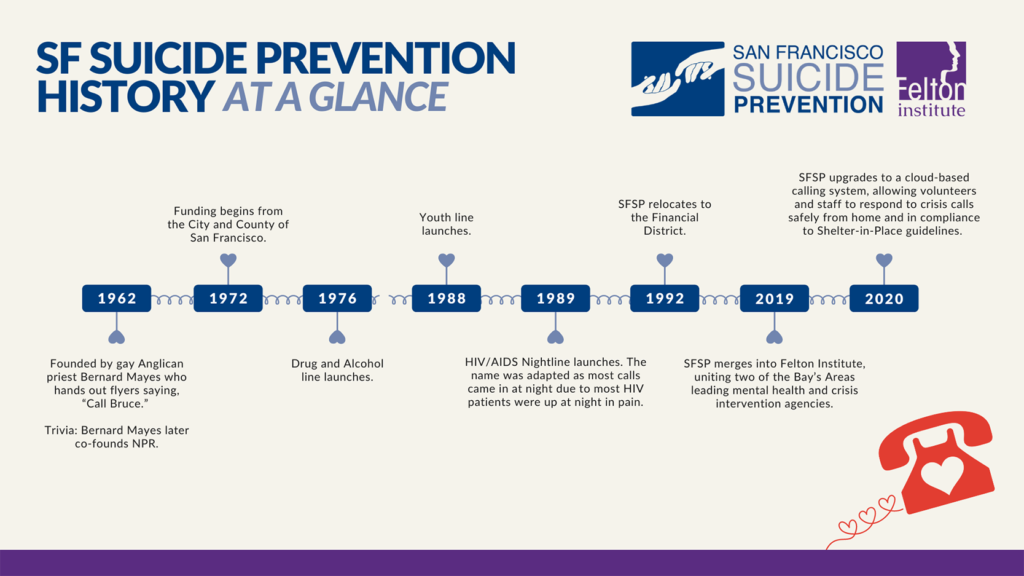San Francisco Suicide Prevention (SFSP) is much more than a 24-hour crisis hotline. This Felton program is also about creating a culture that’s well-informed about mental health through education and community programs, as well as supporting those affected by suicide.
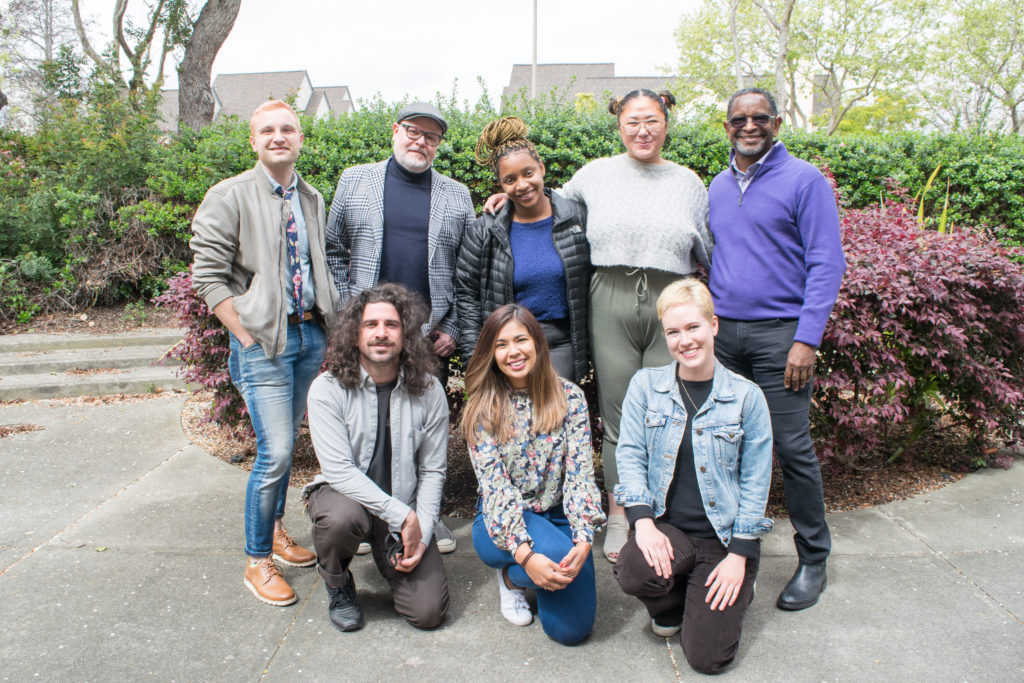
From six volunteers in 1962 working out of a basement tattoo parlor on Polk Street to over 200 active volunteers at present, San Francisco Suicide Prevention has grown into one of the nation’s most admired and modeled suicide prevention programs. As the oldest community-based telephone crisis center in the nation, SFSP trains local volunteers who provide essential suicide prevention and crisis intervention services to callers. Today, the agency runs ten hotlines and receives nearly 200 calls a day, saving lives one phone call at a time.
Surviving the Pandemic
In 2020, many organizations faced increased demand for mental health services related to COVID19, and San Francisco Suicide Prevention was no exception. Since the pandemic, SFSP has seen a 30% increase in high-risk calls – the impact they make on the community really can’t be overstated, according to SFSP Program Director Van Hedwall.
Meanwhile, with shelter-in-place and public health guidelines preventing volunteers from coming into the office, SFSP operations were at risk.
“Volunteers are an integral part of our SFSP community grassroots feeling,” said Hedwall, who has been with the agency for three years. “We needed to find a better way to engage with them and at the same time maintain their safety to continue our relationship during the pandemic.”
Some 150-200 volunteers annually account for the bulk of the SFSP workforce, and come from various backgrounds, including tech. Hedwall explained that one volunteer arranged a meet-and-greet of the SFSP leadership team with Cisco Webex systems leadership team.
Said Hedwall, “Utilizing a special offer from Cisco, we were able to set up a new state-of-the-art phone system with virtual meetings and all the whistles and bells.”
Check out this video about Cisco and SFSP’s partnership.

And despite the pandemic, SFSP has continued to successfully recruit and train an average of 300 volunteers each year. In 2020, due to Shelter in Place (SIP) and the loss of volunteers, it became necessary to meet the challenge by creating innovative recruitment and training methods. A new curriculum of online training was developed to include live zoom training for two new cohorts during SIP, doubling the volunteer staff training remotely during this particular training schedule. In a recent e-Accreditation audit, the Auditor praised SFSP as “having the best training from all centers across the country.”
Getting the Message Out
Suicide is one of the most urgent health problems facing America today. It is the 10th leading cause of death in the U.S., claiming 47,000 lives per year. One of the biggest obstacles health systems face in preventing suicide is losing touch with people when they’re vulnerable. Debunking myths, falsehoods, and stigma around suicide are equally important.
The harsh reality of mental health treatment in the United States is this: people don’t receive enough of it. Statistics from the National Alliance on Mental Illness NAMI back this up — 57 percent of adults and 49 percent of youth struggling with mental illness weren’t able to get treatment, and people of color are even less likely to receive it. The LGBTQIA+ community is up to 12 times as likely to attempt suicide. Normalizing and talking about mental health needs is just the first step in any suicide prevention plan.
To reach these communities, SFSP needed to amplify the message. In the past year, SFSP promoted awareness with Hedwall as a media liaison with several local media on camera and print interviews – including The New York Times, Los Angeles Times, the San Francisco Chronicle and KPIX. Outreach was expanded through engagement to community partners and the general public through direct training of the SF Police Department, the SF Fire Department and SF Emergency Services, Community partnership agencies, and youth outreach through the San Francisco Unified School District.
SFSP has also increased its diversity in new hires to meet Equal Employment Opportunity Commission (EEOC) guidelines. New positions were created based on outreach and hotline needs, including the roles of Hotline Supervisor and Education Outreach Coordinator. The staff has grown to reflect the diverse community it serves.
What’s Next for SFSP
Hedwall shared, “Since the merger with Felton Institute, SFSP has increased our capacity financially, infrastructure improvements, improved mental health awareness in the field of suicidology and study and counseling practice, and increased outreach. Right now, the push for a national 988 crisis number has infused all call centers, including ours, with the possibility of growth and expansion of services.”
This could include possible dispatch of more crisis outreach teams instead of police involvement in mental health incidents.
Hedwall added, “Felton brought SFSP into the 21st century, and we plan to continue to meet the standards of an ever-evolving crisis management call center.”
For more information about Felton’s San Francsico Suicide Prevention Program, please visit http://sfsuicide.org. You can find contact information details on their Contact Page and their 24/hr crisis line is (415) 781-0500.
About Felton Institute: Founded in 1889, Felton Institute responds to human needs by providing cutting edge, evidence-based mental health and social services that transform lives. Felton Institute is a tax-exempt organization registered 501(c)(3) nonprofit under EIN 94-1156530.
Offering more than 50 acclaimed and honored programs that address homelessness, mental health, prenatal, adolescent, adult, and senior needs, Felton Institute provides services in San Francisco, Alameda, San Mateo, Marin, and Monterey counties. Felton’s social services and programs utilize the latest scientific research, combining cultural sensitivity, deep respect for client and staff, and a commitment to social justice.
Felton is the oldest non-sectarian and nonprofit social services provider in the City and County of San Francisco. For over a century, Felton Institute has been at the forefront of social service innovation, pioneering new approaches to meet underserved populations’ emerging needs. At the heart of our work is the belief that individuals and families in crisis must have access to services and resources to help them build on their inherent strengths and develop self-sufficiency. www.felton.org
